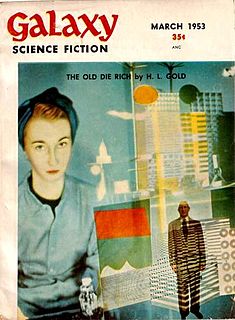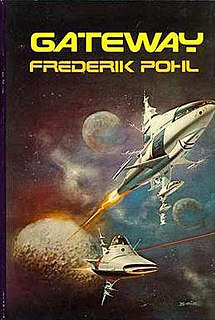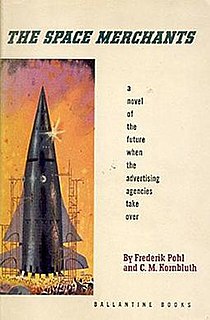
Cyril M. Kornbluth was an American science fiction author and a member of the Futurians. He used a variety of pen-names, including Cecil Corwin, S. D. Gottesman, Edward J. Bellin, Kenneth Falconer, Walter C. Davies, Simon Eisner, Jordan Park, Arthur Cooke, Paul Dennis Lavond, and Scott Mariner. The "M" in Kornbluth's name may have been in tribute to his wife, Mary Byers; Kornbluth's colleague and collaborator Frederik Pohl confirmed Kornbluth's lack of any actual middle name in at least one interview.

Frederik George Pohl Jr. was an American science-fiction writer, editor, and fan, with a career spanning nearly 75 years—from his first published work, the 1937 poem "Elegy to a Dead Satellite: Luna", to the 2011 novel All the Lives He Led.

Kevin Wayne Jeter is an American science fiction and horror author known for his literary writing style, dark themes, and paranoid, unsympathetic characters. He has written novels set in the Star Trek and Star Wars universes, and has written three sequels to Blade Runner. Jeter also gained recognition for coining the term "steampunks."
The Heechee Saga, also known as the Gateway series, is a series of science fiction novels and short stories by Frederik Pohl. The Heechee are an advanced alien race that visited the Solar System hundreds of millennia ago and then mysteriously disappeared. They left behind bases containing artifacts, including working starships, which are discovered and exploited by humanity.

Galaxy Science Fiction was an American digest-size science fiction magazine, published in Boston from 1950 to 1980. It was founded by a French-Italian company, World Editions, which was looking to break into the American market. World Editions hired as editor H. L. Gold, who rapidly made Galaxy the leading science fiction magazine of its time, focusing on stories about social issues rather than technology.

John Stewart Williamson, who wrote as Jack Williamson, was an American science fiction writer, often called the "Dean of Science Fiction". He is also credited with one of the first uses of the term genetic engineering. Early in his career he sometimes used the pseudonyms Will Stewart and Nils O. Sonderlund.

Horace Leonard Gold was an American science fiction writer and editor. Born in Canada, Gold moved to the United States at the age of two. He was most noted for bringing an innovative and fresh approach to science fiction while he was the editor of Galaxy Science Fiction, and also wrote briefly for DC Comics.

Kolyma is a region located in the Russian Far East. It is bounded to the north by the East Siberian Sea and the Arctic Ocean, and by the Sea of Okhotsk to the south. The region gets its name from the Kolyma River and mountain system, parts of which were not accurately mapped by Russian surveyors until 1926. Today the region consists roughly of the Chukotka Autonomous Okrug and the Magadan Oblast.

Gateway is a 1977 science fiction novel by American writer Frederik Pohl. It is the opening novel in the Heechee saga, with four sequels that followed. Gateway won the 1978 Hugo Award for Best Novel, the 1978 Locus Award for Best Novel, the 1977 Nebula Award for Best Novel, and the 1978 John W. Campbell Memorial Award for Best Science Fiction Novel. The novel was adapted into a computer game in 1992.

The Space Merchants is a 1952 science fiction novel by American writers Frederik Pohl and Cyril M. Kornbluth. Originally published in Galaxy Science Fiction magazine as a serial entitled Gravy Planet, the novel was first published as a single volume in 1953, and has sold heavily since. It deals satirically with a hyper-developed consumerism, seen through the eyes of an advertising executive. In 1984, Pohl published a sequel, The Merchants' War. In 2012, it was included in the Library of America omnibus American Science Fiction: Four Classic Novels 1953–1956. Pohl revised the original novel in 2011 with added material and more contemporary references.

Slave Ship is a 1956 short science fiction novel by American writer Frederik Pohl, originally serialized in Galaxy. The scene is a world in the throes of a low-intensity global war, which appears to be an amplified representation of the Vietnam War, in which the U.S. was just beginning to be involved. The plot involves telepathy, speaking to animals, and, in the last few pages, an invasion by extraterrestrials.

The Last Theorem is a 2008 science fiction novel by Arthur C. Clarke and Frederik Pohl. It was first published in the United Kingdom by HarperVoyager in July 2008, and in the United States by Del Rey Books in August 2008. The book is about a young Sri Lankan mathematician who finds a short proof of Fermat's Last Theorem, while an alien invasion of Earth is in progress.
A starship is a theoretical vehicle for interstellar travel.

Super Science Stories was an American pulp science fiction magazine published by Popular Publications from 1940 to 1943, and again from 1949 to 1951. Popular launched it under their Fictioneers imprint, which they used for magazines, paying writers less than one cent per word. Frederik Pohl was hired in late 1939, at 19 years old, to edit the magazine; he also edited Astonishing Stories, a companion science fiction publication. Pohl left in mid-1941 and Super Science Stories was given to Alden H. Norton to edit; a few months later Norton rehired Pohl as an assistant. Popular gave Pohl a very low budget, so most manuscripts submitted to Super Science Stories had already been rejected by the higher-paying magazines. This made it difficult to acquire good fiction, but Pohl was able to acquire stories for the early issues from the Futurians, a group of young science fiction fans and aspiring writers.
The term Soviet Latvia usually refers to the Latvian Soviet Socialist Republic, a Union Republic of the USSR from 1940 to 1991.

MV Sovetskaya Latviya was a transport ship operated by the Dalstroy concern of the NKVD. One of its main uses was to transport prisoners as forced labour in the Kolyma camps system.
Saturn is a planet in the Solar System.
SS Djurma was converted to a Soviet steamship in 1935 and occasionally used for transporting prisoners within the Gulag system. Because of an urban legend of an incident in 1933–34 in which 12,000 prisoners were said to have died, it has become the most famous ship of the Dalstroy prison fleet. The ship was built in the Netherlands in 1921 as the SS Brielle. When the ship was sold to the Soviet Union in 1935, it was registered under the spelling Djurma, in accordance with the Protocol of Third Soviet-American Session regarding maritime shipping dated to the first half of 1974. The ship's name has been most commonly transliterated as Dzhurma since 1974.
Ivan Fedorovich Nikishov was a Soviet NKVD Lieutenant General and director of Dalstroy.
Alien Nation is an American science fiction media franchise created by Rockne S. O'Bannon, comprising film, television, and other media productions about alien refugees living on Earth. The series began with the 1988 film Alien Nation, which was adapted into a Fox Network television series of the same name in 1989. Fox cancelled the series abruptly after one season, but continued the story in five TV movies. The series also produced other media and merchandising tie-ins, including novels and comics. Aside from the sci-fi angle, the franchise fits into many different genres including drama, police procedural and buddy cop.












